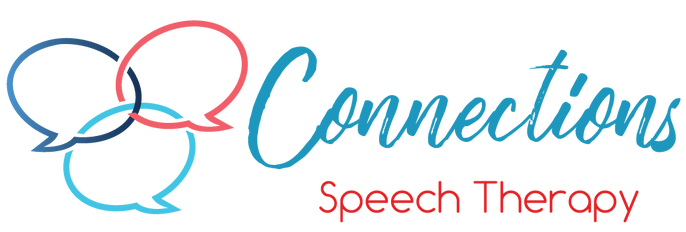 Happy New Year! I have several resolutions that I want to implement in 2019 . . . I want to be more organized, more health-conscious, more productive! And I want to help you implement some simple strategies that can help your child build his or her speech and language skills! Let's talk about those challenges that I am asked about most frequently . . . 1) Is too much screen time hurting my child's speech and language development? Research has proven that screen time does not promote your child’s language development. The American Academy of Pediatrics points out that most apps that are considered to be "educational" are targeting rote skills such as the alphabet or shapes. However, the skills young children need to learn to be successful in school include more social pragmatic skills such as impulse control, managing emotions, and creative problem solving. The best way to promote these skills is through unstructured and social play. Have fun and be silly during everyday interactions, such as bath time, meal time or take a walk to the park! That’s where the best language learning takes place. Strike a balance and facilitate screen time to embed yourself into the interaction . . . if your child has a favorite song they enjoy listening to, sing that song as you get your child dressed or are driving in the car. Exposing your child to screen time is not so bad if you also expose him or her to legos, and farm animals, and making cookies, and splashing in a mud puddle . . . . you get the idea! 2) Should I correct my child if he pronounces a word incorrectly? Errors are an essential part of the learning process as children develop their speech and language skills. It is common for children to make speech errors, but as they grow older, their articulation continues to develop and their pronunciation generally becomes much more clear. A good guideline to follow is that by 2 years old, a child should be understood 50% of the time by an unfamiliar listener. By 3 years old, they should be understood 75% of the time, and by 4-5 years old, they should be close to 100% intelligible even if a few articulation errors are still present in their speech. You want to offer a positive and supportive model for your child. It is the message that your child is attempting to relate that is most important and you want to praise and reinforce that message. *Repeat what your child has said, but use the correct pronunciation. *You may want to give the sound a little extra emphasis. *Use reading as a way to surround your child with the targeted sound. *Slowly tapping and clapping out each syllable can be a fun way to help with clarity. *If you don't understand what your child has said, ask more questions, encourage your child to show you a reference if they can and obtain more information. 3) Is my child stuttering? I am often asked by parents about whether or not they should be concerned about stuttering. Just as articulation errors are a typical part of speech and language learning, so is disfluency. As children learn to speak, they may demonstrate repetition of a sound, syllable or word. Use of fillers such as "uhh," or "umm," is also common. It is common to see these repetitions during a stage of growth when language is rapidly increasing, and these repetitions may come and go throughout different stages or be observed at different times. Disfluencies are likely to increase when children are tired, excited, upset, or being rushed to speak or when they are asking or responding to questions. *Try talking to your child in a way that is relaxed, fun, and enjoyable. *Engage your child in conversation without distractions or interruptions. *Listen attentively to what your child is saying, maintaining normal eye contact without displaying signs of impatience or frustration. *Avoid reacting negatively when your child stutters, correcting his speech, or completing his sentences. *Model a slow, relaxed way of speaking to help your child slow down his own speech. 4) How can I help my child learn to read? Phonological awareness is the area of oral language that relates to the ability to think about the sounds in a word rather than just the meaning of the word. It is an understanding that spoken language is made up of words, and words consist of syllables, rhymes, and sounds. As preschoolers, children start to develop an awareness of individual phonemes and can attend to and manipulate them in a word. By the end of kindergarten, students typically demonstrate the ability to: recognize how many words are in a sentence, segment and blend words of at least three syllables, understand the concept of rhyming, recognize and generate rhyming words, isolate the beginning or ending sounds in words, segment and blend sounds in a word with three sounds, and change a sound in a word to make a new word in familiar games and songs. *Read aloud to your child frequently. Choose books that rhyme or repeat the same sound. Draw your child’s attention to rhymes. *Teach your child nursery rhymes and practice saying them together. *Teach your child about syllables by clapping or jumping to each syllable he hears in a word, pause between each syllable for emphasis. *Play “I Spy.” You say “I spy with my little eye something that rhymes with … or something that starts with . . . . *Develop sound/letter correspondence by filling boxes with pictures or objects that start with a given letter. * Use Lego bricks to break words apart or to blend sounds together. Give your child two attached Lego bricks to represent parts of the word. Then have him physically take the Lego pieces apart as he removes part of the word. 5) Will using sign language or pictures further delay or prevent my child's speech and language skills from developing? Research has shown that using sign language does not negatively impact a child’s language development, and actually increases a child's verbal skills. Children can be taught to use signs or gestures before they are able to use words to communicate and this can significantly reduce frustration for both you and your child. *Select a few signs to use when you talk to your child: Some suggested common first words to sign with your child include: Nouns: dog, cat, bird, shoe, cookie, cracker, apple, potty, car, truck, cup, spoon, bowl, boy, girl, baby, ball, bubble, block, slide Social Words: no, stop, all done, all gone, away, more, again, mine Action Words: go, up, down, eat, open, help Descriptors: big, little, dirty, clean, wet, dry, on, in *Ask your child what he wants and pause for a minute to see if he will say or sign it first. If not, show him the sign and say the word out loud. Pause again and see if he imitates you. If not, take his hands and help him make the sign. Then, immediately reward him by giving him the object or action just as if he had said it. If you have any concerns about these or other aspects of your child's speech and language skills or would like further information or input, please contact Connections Speech Therapy for a free consult.
2 Comments
|
AuthorMy name is Katherine Hindman. I have been a speech therapist for over 20 years and truly love what I do! Archives
November 2022
Categories |

 RSS Feed
RSS Feed